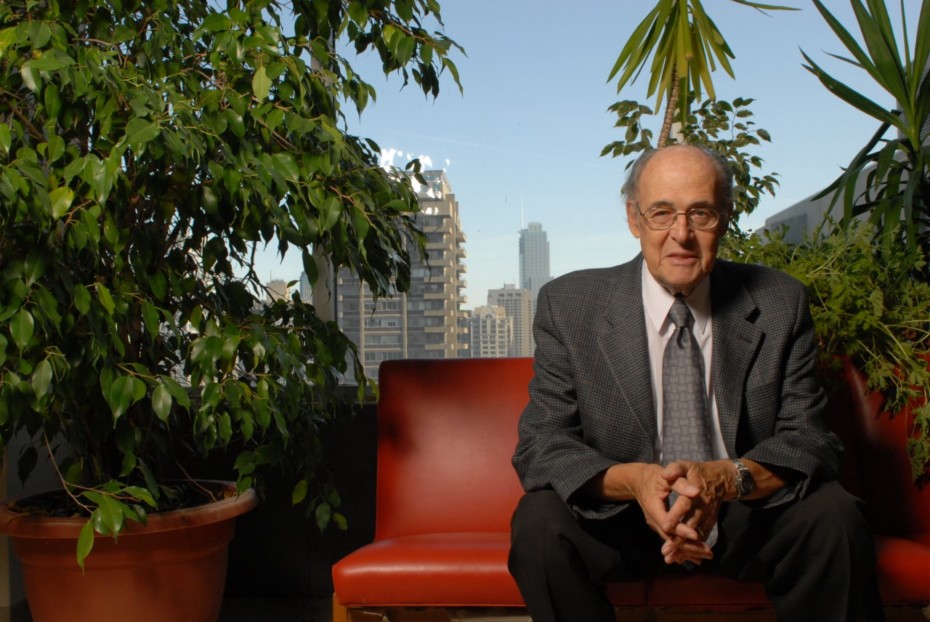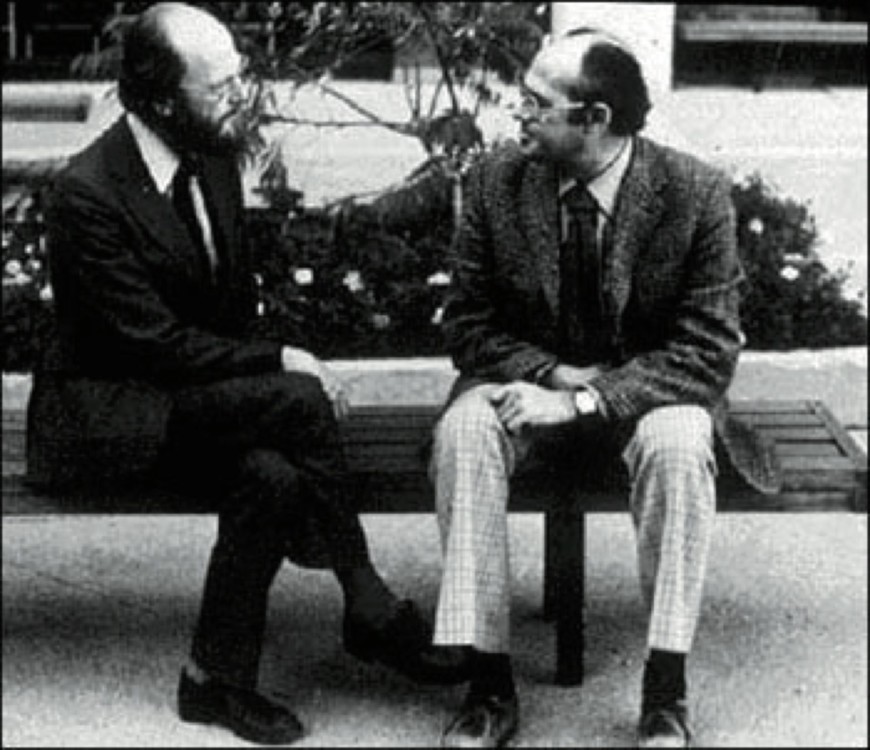
With the passing of Ronald Melzack on December 22, the world lost one of the giants of pain research, a man who revolutionized the study and treatment of pain. Some argue Melzack was, in fact, one of the fathers of the field.
“He’s the most famous and the most prominent pain researcher to have ever lived. I think that’s pretty clear,” said Jeffrey Mogil, Canada Research Chair in Genetics of Pain and the Director of the Alan Edwards Centre for Research on Pain.
“More than that, he and Pat Wall [of MIT] sort of invented the field in the first place. Before their Gate Control Theory of Pain was published in 1965, there were a few physiologists who studied pain a little bit, a few psychologists and a few pharmacologists,” said Mogil. “But after that, people started calling themselves pain researchers. An international society was established and national chapters of that society were formed to study pain. Pain as a field of study wasn’t even an independent entity before Ron.”
Ironically, Melzack almost didn’t make it to university, let alone take an interest in researching pain.
Humble beginnings
Melzack was born on July 19, 1929, to a working-class family. His father, Joseph, worked in a clothing factory and opened a second-hand bookstore. Without the financial means to send all three of the Melzack boys to university, it was decided that Ronald would go to McGill while his two siblings worked at the bookstore.
At McGill, it wasn’t until he took an introductory psychology course that Melzack found a subject that truly piqued his interest. Melzack came under the tutelage of renowned psychologist Donald Hebb, the Chairman of Psychology at the time. Hebb would serve as Melzack’s Master’s and PhD supervisor.
In a 2008 interview with the McGill Reporter, Melzack said he all but stumbled into pain research while working with Hebb. “It was an absolute fluke,” he said at the time.
Dog days pay dividends
While working with Hebb on the problem-solving ability of dogs, Melzack noticed that the animals that had been raised in relative isolation barely reacted when, in their exuberance, they accidentally ran into a low-hanging pipe. “I began to realize that pain is subjective. You may have an injury, but the injury is not the pain,” he said.
This chance observation would form the basis of his PhD thesis and, eventually, the development of the seminal publication 1965 Gate Control Theory of Pain.
With the theory, he and Patrick Wall argued that psychological factors and environment play a large role in feeling pain, and that pain is subjective and ultimately at the mercy of the brain. This overturned the then-accepted view of pain as a primitive and static danger warning system.
According to the Canadian Medical Hall of Fame – to which Melzack was inducted in 2009 – “The theory produced an explosive growth of research and resulted in experimental and clinical psychology becoming an integral part of pain research and therapy.”
Game-changing clinical tool
On the recommendation of Herbert Jasper, a brilliant neurophysiologist at McGill and one of the pioneers of the EEG, Melzack pursued his postdoctoral work in the pain laboratory of Dr. William K. Livingston at the University of Oregon Medical School. While working with people suffering from debilitating chronic pain, Melzack met a patient named Mrs. Hull.

“Mrs. Hull had a great impact on me,” said Melzack in the 2008 interview with the Reporter. “She was a woman in her late 70s with diabetes. She developed gangrene and had to have both of her legs amputated. I liked her; we talked a lot, her and her marvellous husband Willy. I was a bachelor then, and I would take them for afternoon drives on Sundays, and we became quite friendly. She was a highly intelligent person with a good vocabulary, and I began to collect her descriptive words about pain like ‘burning,’ ‘shooting,’ ‘crushing,’ ‘horrible’ and ‘excruciating.’
The list, supplemented with descriptors from other patients formed the basis of the McGill Pain Questionnaire, which he devised in 1975. Today, the questionnaire is still the world’s most widely used method for measuring pain in clinical research, having been translated into 50 languages.
“If a scientist publishes one significant finding it can make their career. You can be a famous scientist – a really famous scientist – from one finding,” said Mogil with a laugh. “Ron had at least two. What is even more remarkable is that his second significant finding, the McGill Pain Questionnaire, wasn’t something that just built on the Gate Control Theory of Pain. It was a completely different. To have not one, but two, papers that are completely unrelated, both of them with that much impact, is insanity.”
In recognition of his breakthrough research, Melzack was appointed an Officer of the Order of Canada (1995) and received the Prix du Québec for research in pure and applied science (1994). Among numerous awards, he was elected a Fellow of the Royal Society of Canada (1982), was honoured with a Killam Prize (2001), and earned the Grawemeyer Award for Psychology (2010).
A Canadian first
A visionary leader, Melzack co-founded Canada’s first pain clinic at McGill where he served as Research Director between 1974 and 2000. The clinic later became known as the Alan Edwards Pain Management Unit of the MUHC, and grew to become a world leader in pain management and pain medicine in the clinical, educational and research domains.
Melzack, along with businessman and philanthropist Alan Edwards, was also instrumental in establishing the Alan Edwards Centre for Research on Pain in 2002. The Centre brings together the McGill community of basic and clinical pain researchers to promote research that will result in cures for chronic pain.
“Because of Ron we have a very prominent clinical pain management unit – the first in Canada and still one of the best,” said Mogil. “We have probably the best pain research centre in the world. And really, the only reason why [pain researchers] like me, Catherine Bushnell and Gary Bennett came to McGill, as opposed to some other institution, is because Ron started something that turned into a really big deal.”
Mogil says he came to McGill in 2001 at the behest of Melzack, who encouraged him to apply for the Chair that Melzack he had just retired from. “When Ron Melzack tells you to apply for his job, you apply for his job,” said Mogil.
“A great scientist… and an unpretentious, generous mensch”
On top of his ground-breaking research Melzack also left his mark as a mentor to young scientists in the early stages of their careers.
John O’Keefe, co-winner of the 2014 Nobel Prize in Medicine, credits Melzack with helping lay the foundation for his seminal work. O’Keefe received his doctorate in physiological psychology from McGill in 1967, with Dr. Melzack acting as his supervisor. In a 2014 interview with the McGill Reporter, O’Keefe remembered Melzack as “a terrific mentor. I have a lot to thank him for.”
O’Keefe recalled how Melzack’s support went above and beyond that of a typical PhD supervisor.
“When I first went to McGill it was all sealing wax and rubber bands, and we all shared a very, very small amount of equipment in the physiological psychology group – but then Ron got a very large grant and he was very generous with it,” O’Keefe said. “He gave me and a very, very talented neurologist named Ken Casey, enough money to build a very good electro-physiological lab – and then I went on to start to use that to start to develop some of the techniques that I used on the hippocampus. So, he was terrific and I am eternally indebted to him.”
Perhaps the most succinct tribute paid to Ronald Melzack in the weeks since his passing came from Steven Pinker, famed cognitive psychologist and linguist, who offered his condolences on the Paperman & Sons website.
“Ron was a great scientist – a pioneer in our understanding of pain – a great humanitarian, dedicated to the relief of human suffering – and an unpretentious, generous mensch,” wrote Pinker. “He leaves a legacy not only in those who remember him, but in every human in perpetuity whose pain is relieved by scientific knowledge.”
Editor’s note: In an earlier version of this article we wrongly said Ronald Melzack endowed a research chair in the Department of Psychology, and later helped create the Alan Edwards Centre for Research on Pain in 2002 through his financial support. In fact, the financial support for both of these initiatives came from businessman and philanthropist Alan Edwards, a longtime friend of Melzack’s. We regret the error.
